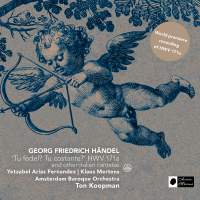Texte paru dans: / Appeared in: |
|
|
Outil de traduction ~ (Très approximatif) |
|
|
Reviewer: Joshua
Cohen Another program of Handel’s Italian cantatas (the third to come my way this year), but with a difference. This one features the world premiere recording of a previously unknown cantata, Tu fedel? Tu constante?, for soprano, oboe, strings, and continuo, which was discovered serendipitously by John H. Roberts (Emeritus Music Librarian of UC, Berkeley) in a bound collection of Handel cantatas owned by the renowned conductor and harpsichordist Ton Koopman. The present release, which leads off with the newly discovered cantata (now catalogued at HWV 171a) is timed to coincide with the publication of the score by Bärenreiter in September 2016. Koopman himself conducts the performances from the keyboard. The soprano and bass soloists are Yetzabel Arias Fernandez and longtime Koopman associate Klaus Mertens.
The debutant cantata follows more or less the same pattern as the other works on this CD, all of them composed between 1706 and 1708 during Handel’s first visit to Italy. Within a classical pastoral setting (an established convention in the secular vocal chamber music of the Baroque era), a heartbroken young shepherdess or shepherd complains of the disdain and/or infidelity of her/his love interest. This particular mini-drama centers on the shepherdess-soprano (unnamed here, but evidently not Licori or Filli, identified as her competitors) as she confronts her lover, Fileno, with her discovery of his philandering. It is built around four arias, each preceded by a brief recitative, which might be summarized as follows: I. (animated and somewhat florid): “Have you been hitting on other girls?”; II. (similar): “Make a choice, you jerk!”; III. (a slow, languishing Siciliana): “If you felt my pain, you’d treat me differently”; and IV. (springy and resolute, but a tad petulant): “To hell with you, I’ll find another boyfriend!.” You will notice that throughout the scene poor Mr. Fileno never gets a word in edgewise. Never fear. The male principal is given ample opportunity to air his longings, sorrows, and recriminations in the four solo cantatas that follow on the disc: two written for bass voice and two for soprano (possibly, originally, the stalwart Margarita Durestanti, who went on to create a number of male, as well as female, roles in Handel’s operas over the next 25 years). We’re also given two chamber duets for soprano and bass, which in the context of this program come across as summit conferences between estranged lovers immediately following the breakup (or possibly a “clearing-of-the-air” between breakup and reconciliation).
My description above implies that five solo cantatas and two duets, taken together, can be taken as a single, extended, episodic drama: a kind of pastoral soap opera. In fact, I’m not at all certain that this was the intention of Koopman and his performers, and the shifting vocal registration of the male character does confuse things a bit. (Handel, of course, would have regarded the pieces as entirely independent compositions.) The point is that all of the cantatas share a common theme (erotic passion and its discontents) and a common vocabulary of musical gestures and poetic tropes. An additional question arises as to whether these lyrical agonies and ecstasies are to be taken entirely seriously. My impression is that while the cantatas were not intended to be parodies, in the pure SNL sense of the term, they were meant to entertain a sophisticated, culturally literate audience, and a certain comic irony can be inferred in some of the more extravagantly pathetic or florid passages. These are not tragedies. The suffering may be real enough (love hurts sometimes), but nobody dies. In any case, the music of the arias, if rarely as memorable as Handel in the full flood of his powers (the mature operas and late oratorios) or even the exquisite 1718 pastoral opera Acis and Galatea (where refined parody and genuine tragedy are seamlessly interwoven). The Siciliana from Tu fedel? Tu constante, mentioned earlier, is a lovely piece. There is also a delightful, lilting air for soprano with recorder obbligato (“Giacché il sonno a lei dipinge”) from Pensieri Notturni di Filli and some enjoyably rollicking solos (as well as surprisingly tender ones) from the two bass cantatas.
A year and
a half ago, I criticized Ton Koopman for what I considered to be an overly
fast and flippant approach to Bach’s St. Matthew Passion. That same
propensity for dash and alacrity is entirely appropriate for these
youthfully exuberant cantatas, and the playing of the Amsterdam Baroque
Orchestra is splendid throughout. Regarding the singers, I have some
reservations, none of them prohibitive. Fernandez, whom I haven’t heard
before, is an interesting singer with a pure, whitish timbre and ample
flexibility, but also a fondness for straight-toned attacks and an
unsettling way of hooting out the high notes. The veteran Klaus Mertens is
renowned for his performances of Bach’s Passions and cantatas. At 67, his
voice has dried out a little but retains its firmness. He manages the wide
range of his music with unostentatious assurance, never forcing his tone or
compromising its clean, forward placement. The objection might be raised
that the music was written for Italian opera singers, and these are not
particularly Italianate performances. But until a more vibrant version is
put on the market (perhaps with Luca Pisaroni singing the bass solos, and
Julia Lehzneva the soprano parts), this well-chosen program, with its
noteworthy premiere, will serve well enough. | |
|
Support us financially by purchasing this disc from eiher one of these suppliers. Un achat via l'un ou l'autre des fournisseurs proposés contribue à défrayer les coûts d'exploitation de ce site. |
|
|
|
|
|
Cliquez l'un ou l'autre
bouton pour découvrir bien d'autres critiques de CD |
|




